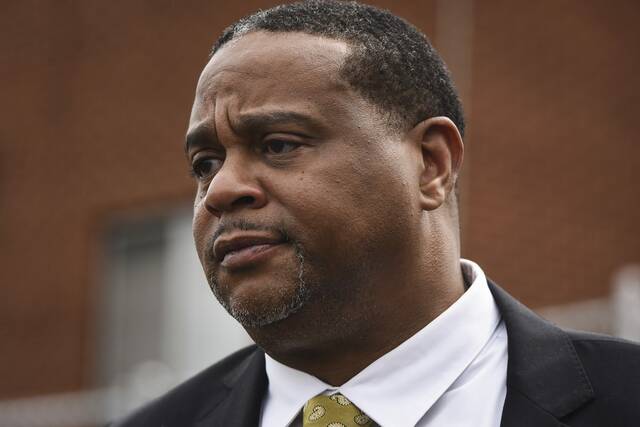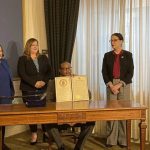Pittsburgh Mayor Ed Gainey signed an executive order Tuesday calling on the city’s finance and law departments to investigate whether the city’s purely public charities meet requirements for tax-exempt status.
Purely public charities are nonprofits that, under the state’s definition, must advance a charitable purpose, donate a substantial portion of their services, benefit a substantial class of people in need of charity and operate entirely free from private-profit motive.
They include many of the city’s colleges and universities and health systems.
Gainey said more than a third of all properties in the city are tax-exempt, and he wants to make sure the nonprofits that own them are living up to the expectations on purely public charities.
“If you pass the test, then the city is truly benefiting from your presence and your tax-exempt status has been earned,” Gainey said.
Those that fail the test, he said, will need to pay their fair share to the city.
If all of the city’s nonprofits paid taxes, Gainey estimated they would pay a combined $36 million in city taxes annually.
Officials will refer any nonprofits that do not pass the city’s review to the county, said city solicitor Krysia Kubiak. There will be a process through which property owners can object if they feel they do meet the requirements.
Kubiak said she does not anticipate that the city will begin collecting taxes from these entities soon, explaining there will be a “long process.” The reviews will likely take several years, she said.
Officials plan to start with nonprofits that have the largest properties, Kubiak said. She declined to provide examples of which properties may be investigated first.
The city also will prioritize purely public charities that residents report as likely violating one or more of the requirements set forth by state law. Residents can report their concerns to report@pittsburghpa.gov.
“We will do this fairly and equitably so we are looking at each one in the same light,” Kubiak said.
Entities that do not pass the city’s assessment will not see an impact on their standing with the IRS or their ability to accept tax-exempt donations, Gainey said.
Houses of worship will be exempt from the city’s review, the mayor said.
UPMC, one of the city’s large nonprofits, said the health care giant “has long been committed to being a great neighbor” for city residents.
“The city of Pittsburgh and Mayor Ed Gainey, with whom we have met, are aware of UPMC’s ongoing support and can count on our full participation in programs that are fair and equitable and include the region’s other nonprofits,” said Paul Wood, the nonprofit’s vice president and chief communications officer.
UPMC touted contributions it has made to the city, including a $100 million fund for Pittsburgh Promise in 2007, the opening of the new UPMC Matilda Theiss Health Center in the city’s Hill District and medical and behavioral health services provided at the newly opened Second Avenue Commons homeless shelter.
Highmark Health and AHN officials also meet regularly with local leaders, spokesman Dan Laurent said.
“We are committed to meeting the expectations and requirements of purely public charities, and we look forward to a continued partnership with the city and county to help make our community healthier and stronger,” Laurent said.
The city has a “drastic amount” of tax-exempt properties, but has never undertaken such a review process before, Kubiak said. She said she suspects the city may find instances of fraud during its review.
“The city of Pittsburgh is facing a revenue shortfall, especially once the (American Rescue Plan Act) funds run out,” she said, referring to the federal stimulus funding that must be expended by the end of 2026. “We need this money in order to properly run the city.”
City officials last year began exploring a payment-in-lieu-of-taxes program in which nonprofits would make voluntary payments to the city based on a percentage of what they would owe to the city if they weren’t tax-exempt. Officials estimated such a program could generate about $14.5 million a year for the city.
Gainey said the city is continuing to talk with nonprofits about the program, but it is not collecting any payments from them.
“We feel this is the direction we need to go right now,” Gainey said of his executive order.
U.S. Rep. Summer Lee, D-Swissvale, said Pittsburgh residents “deserve confidence that their tax dollars are reinvested in our communities, and not being cheated by entities exploiting charity status to avoid paying their fair share.”











